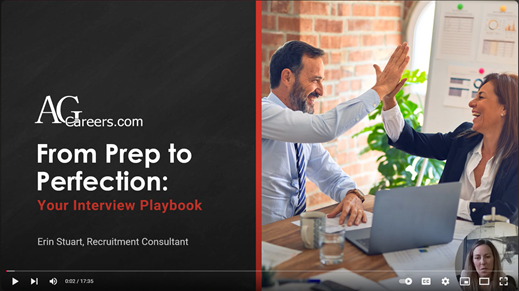- Candidates
- Login
- Set Up Account
- Create a Job Alert
- Search Tools
- Resources
- Employers

"The best candidates don't always get the job; the candidate who interviews the best gets the job!"
Erin Stuart, a Recruitment Consultant from the Talent Solution Team and De Lacy Executive Recruitment North America, brings her bag full of tips and skills so YOU can ace your next job interview!
She spends her day finding the best fit for organizations, finding roles in primary agriculture to director-level positions.
Time Spent preparing for your interview is time well spent.
Key Interview Preparation Strategies to Impress Employers:
Do your research on the organizations!
Agriculture HR professionals and hiring managers say that one of the best ways to stand out is to research the organizations before interacting with them. Research the company structure, customers, competitors, and products.
If you do the research and still need help understanding parts of the company you are applying for, you can ask those questions. It shows interest and that you invested in what the company does.
Review the job description and have your talking points ready.
Print it
Write an example of each response to prepare yourself for questions that may be asked during the interview.
Use metrics to add value to what you are saying ($, %)
Example: "I created a marketing plan at my last job, which saw a 25% increase in clients.” It is about putting metric value into your work.
Know your resume
Print your resume and have it in front of you
Make some notes about projects, tasks, customers, or situations that have transferable skills for the job you are interviewing for, and being able to respond quickly to questions with your experience will put you ahead of the other applicants.
Think through common interview questions
What are your strengths and weaknesses? – If you are having a hard time identifying your strengths and weaknesses, an exercise that could help you would be getting a piece of paper, putting a line in the middle of it, and reflecting on your career or education; think of a few high points and achievements put those on one side. The other side puts your weaknesses or lower points in your career or education. Then, think about what led to those moments, and you will see a shared point or pattern that led you to that high and low point.
Answering this question about your strengths and weaknesses can also help you look back on your career and education and find relevant experiences where you learn transferable skills that can apply to the job you are interviewing for.
7 Tips for Perfection in interviews
1) What is a common misconception about you
The interviewer may already have misconceptions about you, so own it!
2) Do not critique your employer.
If you have a current employer or left your last employer for a specific reason, rehearse what you would say about your employment and the situation that occurred, as it is looked down upon by recruiters when applicants criticize their current or last employer.
3) Why have you applied for this position?
Think about this question: Think about your WHY. Is it a personal reason, professional reason, or even both? Most importantly, be enthusiastic and show the interviewer your interests and the skills you have to offer.
4) Where do you want to see yourself in five years?
Be honest: But think about the impact your response could have on the interview's success. The recruiter may not like hearing that you plan to move on in a year. Also, consider whether you want to grow into a leadership or management role. Or would you like to stay more customer-focused? Consider how you want to grow in the next five years so you are not put on the spot during an interview.
5) Always have questions for your interviews.
Examples: "What do you see as the greatest challenge in the role?" Or at the end of the interview, "What are the next steps from here?"
6) Write, Rehearse, Repeat (Your Intro).
Employers want to know why you are the best person for this role. This step is recommended to do last as you already have done your research on the company, finding experiences in your life that fit the job description, knowing your strengths and weakness
so you can incorporate parts of the information you gather and put into your intro where you think it an appropriate fit.
Write out:
Your name
Education
Your work experience – highlight similar roles, success, and relevant projects
Rehearse intro
2 - 4 minutes, maximum 4 minutes long intro
7) Have References.
If you are new to the workforce, that is okay. You need someone who can validate your work experience.
Set up your free candidate account at www.AgCareers.com to track and manage your applications, upload your resume to the database, and more!
Watch the full “From Prep to Perfection | Your Interview Playbook | with Erin Stuart” webinar here.